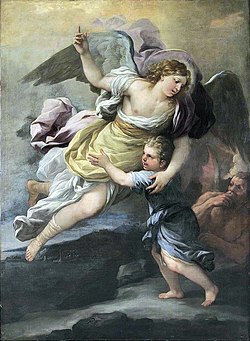History
Devotion to the angels is an ancient tradition which the Christian Church [3] It began to develop with the birth of the monastic tradition. [4] The feast was first kept by the Franciscan order in 1500. [5] This feast, like many others, was local before it was placed in the General Roman Calendar in 1607 by Pope Paul V. The papal decree establishing the feast was cosigned by Robert Bellarmine, which has led some scholars to speculate that the feast was created under the influence of the Society of Jesus. [6] It was originally ranked as a double, and is believed that the new feast was intended to be a kind of supplement to the Feast of St. Michael, since the Church honoured on that day (29 September) the memory of all the angels as well as the memory of St. Michael. Clement X elevated it to the rank of an obligatory double, and, finally, Leo XIII raised the feast to the rank of a double major. [7] Since 1976, it has been ranked an obligatory memorial. [8]
On October 2, 1795, Pius VI granted a partial indulgence every time, with a contrite heart and devotion, any of the faithful say the Guardian Angel prayer. The prayer reads, "Angel of God, my guardian dear, To whom his love commits me here, Ever this day be at my side, To light and guard, to rule and guide. Amen." Pius VI also granted a plenary indulgence on the feast of the Holy Guardian Angels (Oct. 2) to those who have said the prayer morning and evening throughout the year, provided they meet the other usual requirements of receiving a plenary indulgence (truly penitent confession and reception of the Eucharist, visiting a church or oratory, and praying for the Sovereign Pontiff). On June 11, 1796, Pope Pius VI granted another plenary indulgence to those who have frequently said this prayer at the hour of their death, provided they have the required dispositions. Pope Pius VII confirmed these indulgences of his predecessor again on May 15, 1821, and additionally granted a plenary indulgence once a month, on any day of the month, to those who have prayed the Guardian Angel prayer every day for a month, under the same aforementioned requirements to receive a plenary indulgence. [9] Following the abrogation of these indulgences, a partial indulgence is granted in the 1968 Enchiridion . [10]
John XXIII wrote a Meditation for the Feast of the Guardian Angels, which reads, in part: "We must remember how admirable was the intention of divine Providence in entrusting to the angels the mission of watching over all mankind, and over individual human beings, lest they should fall victims to the grave dangers which they encounter." [11]
This page is based on this
Wikipedia article Text is available under the
CC BY-SA 4.0 license; additional terms may apply.
Images, videos and audio are available under their respective licenses.
